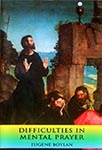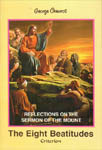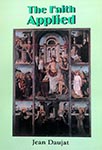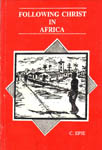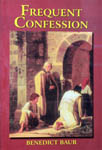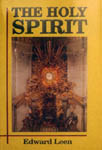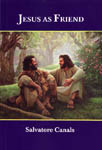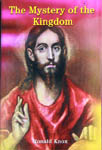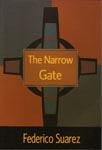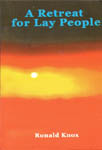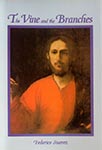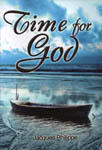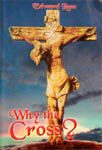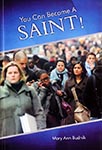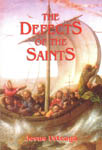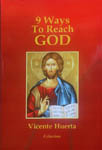Spiritual Growth
The Church’s twenty-century -old wealth of spirituality is shon in many devotions: to the Holy Trinity, to the Holy Spirit, to our Lord Jesus Christ and his Passion, to the saints. Starting with the Holy Mass, root and centre of the interior life, this book puts some of these devotions and prayers together with a view to helping Christians pray both privately and collectively – with the family, with friends, in church. Each person has to find out which devotions are most suited to him or her and practise them perseveringly, because sanctity is not the result of an accumulation of pious practices, but a constant growth in love.
DIFFICULTIES in mental prayer are not to be thought of as blocks or problems in prayer. Those difficulties can become prayers themselves.
Dom Eugene Boylan’s purpose is to discuss the nature and ways of prayer from the point of view of the individual. It is not a scientific analysis nor a certified catalogue of various difficulties, but rather, it is modern spirituality at its best: a book that will encourage the reader to press on and to persevere and to struggle in prayer, no matter what.
This book is a simple and yet insightful commentary on the Eight Beatitudes, which open the Sermon on the Mount. The listeners were impatient to know Jesus’ messianic programme and hear the promulgation of the kingdom’s laws. But instead of enumerating them in the manner of the precepts of the Decalogue, he praised those who observed them. He called on the `blessed’, the fortunate in whom God would reign and on whom he was counting to establish his kingdom on earth.
The Faith Applied emphasizes the importance of doctrinal knowledge and ascetical practice to ensure serious personal commitment in living the Faith.
Author Jean Daujat explains the demands of the Christian Faith with clarity so that one may struggle to live them well. Beginning with life’s ultimate aim—salvation—he progresses through the subjects of charity, perfection of virtue, prayer, presence of God, interior struggle, union with the life of Jesus Christ, and finally the sacraments, Scripture and spiritual direction. This work provides a complete spiritual overview to show what is necessary to take one’s Faith more seriously and to live it with a great spirit of struggle.
“I am convinced that God meant Christianity for Africa as He meant Africa for Christianity. This is the message of this book, a message that fills the African heart with pride. May the book lead all its readers to follow Christ with greater fidelity and sense of commitment” Anthony O. Cardinal Okogie
FREQUENT CONFESSION presents convincing and strong evidence for the benefits of frequent reception of the sacrament of Penance for the health and growth of the spiritual life of all the faithful.
The practice of frequent confession remains a concrete and visible expression of a true Christian outlook on human life as “the personal encounter with the forgiving Jesus in the sacrament of Reconciliation is a divine means that keeps alive in our hearts and in our communities a conciousness of sin in its perennial and tragic reality, and that actuality brings forth, by the action of Jesus and the power of the Spirit, fruits of conversion in justice and holiness of life, by this sacrament we are renewed in favour, strengthened in our resolves, and buoyed by divine encouragement” (John Paul II, address to American Bishops, 1979).
The Holy Spirit answers the need of many people for “a deeper and more accurate knowledge of the Holy Spirit,” in the author’s words. The Holy Spirit’s role in creation as the fountain of life and the first of God’s gifts is studied along with the Spirit’s mission, divine filiation, and the principles of growth.
A detailed summary of the book has been prepared by Rev. Robert P. Bucciarelli to enhance reading of the text.
This classic about the Holy Spirit explains with clear language the essential notions that any Christian is interested in knowing about the role that corresponds to the Comforter in the work of our sanctification; on the nature of those marvellous dispositions received on the day of our baptism, which we call the gifts of the Holy Spirit and by which the divine Spirit wants to effectively move the faithful soul towards its ultimate supernatural end; and, finally, on the precious fruits that these gifts infallibly operate in every soul that unreservedly abandons itself to the action of the Holy Spirit.
This book is written to help those seeking to follow our Lord to obtain the silence of the soul necessary to hear and understand the will of God.
The author presents the full panorama of the Christian life. The subjects include our Lord’s call to everyone to a life of perfection, a constant spiritual struggle through the practice of human and supernatural virtues, and the frequent reception of the sacraments.
“There is nothing new in Archavvot’s Baur’s approach to the inner life, but he says things long familiar to us using a language adapted skillfully to our present-day need.” (Placid Jordan, O.S.B.)
In the School of the Holy Spirit the author will lead you to be more attentive to the movements of the Holy Spirit in your life as you learn to value the third person of the Trinity as the Sanctifier of your soul. Philippe explains the rewards of being attentive to the Holy Spirit, and provides simple and concrete ways to grow in this inner sensitivity.
In his clear and simple style, he illustrates his points with many examples from modern life. The book can be a valuable aid in your own spiritual journey.
Based on the teachings of St. Josemaría, this series of short meditations gives you simple ways to make that saint’s passionate love for God your own.
You’ll find penetrating Catholic insight on the Christian vocation, interior life, Christian hope, humility, celibacy and chastity, death, and much more — plus guidance on how to overcome temptation, handle humiliations, and find serenity.
Best of all, the author presents these insights from the perspective of everyday life, so that you can use them to enrich your daily duties and activities.
THIS MODERN CLASSIC by Mons. Ronald Knox, the renowned author and preacher, is brought back into print for the benefit of the new generations of readers to help them develop a deeper knowledge of Jesus Christ and his Mystical Body, the Church.
This book is a treasure trove of wisdom and inspiration which offers a clear vision of Our Lord’s parables, gathered as a single system with uniform principles of interpretation and a uniform ground-plan namely, the Catholic doctrine of the Church and of human salvation thrown into relief against a background of Jewish Messianic speculation.
How do you speak about God to people today, especially to young people? What language do they understand? In this selection of meditations, the author presents the adventure of seeking Jesus Christ and the greatness of the task he offers them.
Fr. Federico Suarez urges them to go against the current of an easygoing life and to commit themselves generously, giving testimony to their faith in all its consequences.
He is the author of a number of books of spiritual biography and meditations, including Mary of Nazareth, Joseph of Nazareth, and About Being a Priest, all available from Criterion.
The twenty four meditations which make up A Retreat for Lay People were composed by the author during his long experience of preaching retreats. They are so arranged as to fit in with the traditional lines laid down in the Spiritual Exercises. They fall into three groups of eight: of these, the first represents the “foundations”; the second is based on the life and death of our Blessed Lord; the third envisages practical day-today needs. Between the first group and the second, and again between the second group and the third, there are useful suggestions to those who are following the devotion to the Holy Hour. Their direct and clear style will help both young and mature readers make a good retreat.
This book, by a mother and grandmother, explains why there is so much turmoil in our personal lives and in the world. It answers the questions: How can I find peace and happiness? Why should I go to confession? What should I confess? Why tell my sins to a priest? What is a mortal sin? Where in the Bible does it mention confession? It’s been so long since I went to confession. What do I say? What do I do? How can I use confession to grow in holiness? How do I examine my conscience?
One of the worst evils God encounters in the world is ignorance since it is impossible to love a person whom we do not know. In the final analysis, either we know God or we don’t know him. And many don’t know God in the light of what he has revealed. They know a god fashioned by their own thoughts, which are often the result of fears and worldly ambitions. We may say that they don’t know God at all, because what they know about him in no way corresponds to what he actually is. And only when we know God can we love him, for love is deeds, not sweet words.
This book draws from the clear waters of Catholic Truth to help the reader, who is so often immersed in a contaminated doctrinal environment, acquire the certainty of the Faith.
Many people today are thirsty for God and feel a desire for a personal prayer life that is deep and ongoing. But they encounter obstacles that prevent them from following the path seriously and with perseverance. Time for God, an international bestseller, was written with these desires and difficulties in mind.
The author focuses on mental prayer: prayer that consists of facing God in solitude and silence in order to enter into intimate, loving communion with him. Practicing this kind of prayer regularly is considered by all spiritual masters to be an indispensable path that gives access to genuine Christian life—a path to knowing and loving God that empowers us to respond to his call to holiness addressed to each individual.
Jesus’ death on the cross is the central act of human existence which links every act of suffering, self-giving, or self-denial with God Himself. The author of the book, Why the Cross? is a priest who wrote on the eve of World War II, makes the connection between the Crucifixion as the horrible expiation for all sins, and the need for ordinary faithful to willingly embrace suffering in its various forms to find their way to God.
The book addresses the question of how we obtain happiness amidst suffering and the problem of pain.
“Too many use their religion as medicine and not as food. They make of it a remedy for evil and not a means to good.”
God dwells in inaccessible light (Tim 6:16). How will man ever lift himself to such dazzling heights?
Here human ways and means must fail; with them we can build no bridges into the infinite. If God wishes us to reach His perfection, He must show us the way Himself. To say Yes, Father is to declare one’s readiness to be guided by God in every moment, to follow Him step by step.
It enters into but few peoples’ minds that they should work at becoming saints. Most think that to become a saint requires the almost-impossible. The truth is: not only should we work at fulfilling our baptismal call, but we can! Not only is it possible, but it is our ultimate goal, our mission, our reason for being!
Mary Ann Budnik walks us through the simple life choices that lead us to the interior disposition needed for sanctity so that we can become rich soil ready to sprout and nourish an abundance of fruit. Of course, one cannot do it alone. With the grace of God working in our hearts, and our willingness to become malleable in his loving hands, sanctity is truly a task that becomes both desirable and accessible.
Sins and shortcomings; Struggles and defeats; Repentance, a fresh start and a great love for God and neighbour. This is the stuff saints are made of.
A frank, no-frills look into the lives of the men and women of the Bible in the intimate contemporary style the author is known for.
Retuning to our Father God once, twice … always! has made saints of ordinary mortals like us. The goal is not as impossible as you think…
“Mental prayer is nothing else than an intimate friendship, a frequent heart-to-heart with Him by whom we kow ourselves to be loved” ST. TERESA OF AVILA
Is it possible to transform the world to make it more in line with God’s dreams? For the author the task of contributing to the building up of society is an exciting apostolic project, which Christians must carry out with the help of the Lord’s grace. “To recompose what we have broken with sin, to contribute to building up the kingdom of God (…), a kingdom of truth and life, of holiness and grace, of justice, love and peace. The Lord calls us to all this.

